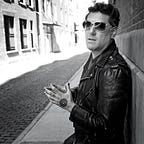The Strangest Secret
How a Pearl Harbor veteran and radio broadcaster unlocked the secret of life in six words
The emergence of business motivation as an electronic medium — first on vinyl albums, cassette tapes, and DVDs and later through podcasts, audiobooks, and apps — grew from the aching search of a child of the Great Depression.
He was a Marine who survived the attack on Pearl Harbor, a successful broadcaster and salesman, and, above all, a relentlessly curious man who hungered to know what set apart successful people.
His deep, sonorous voice became familiar to millions after he recorded “the secret” to success on a pioneering vinyl record in 1956. His name was Earl Nightingale (1921–1989).
Nightingale was born in 1921 in Long Beach, California. By the time Earl was twelve, in 1933, his father had abandoned the family. Earl, his mother, and two brothers lived destitute in a “tent city” near the Long Beach waterfront, home to people displaced in the Depression.
Earl’s mother supported the family by working as a seamstress in a WPA factory. The adolescent Earl despaired not only of the family’s poverty but also of the people he came in touch with. Everyone around him seemed backbiting, sullen, and directionless.
